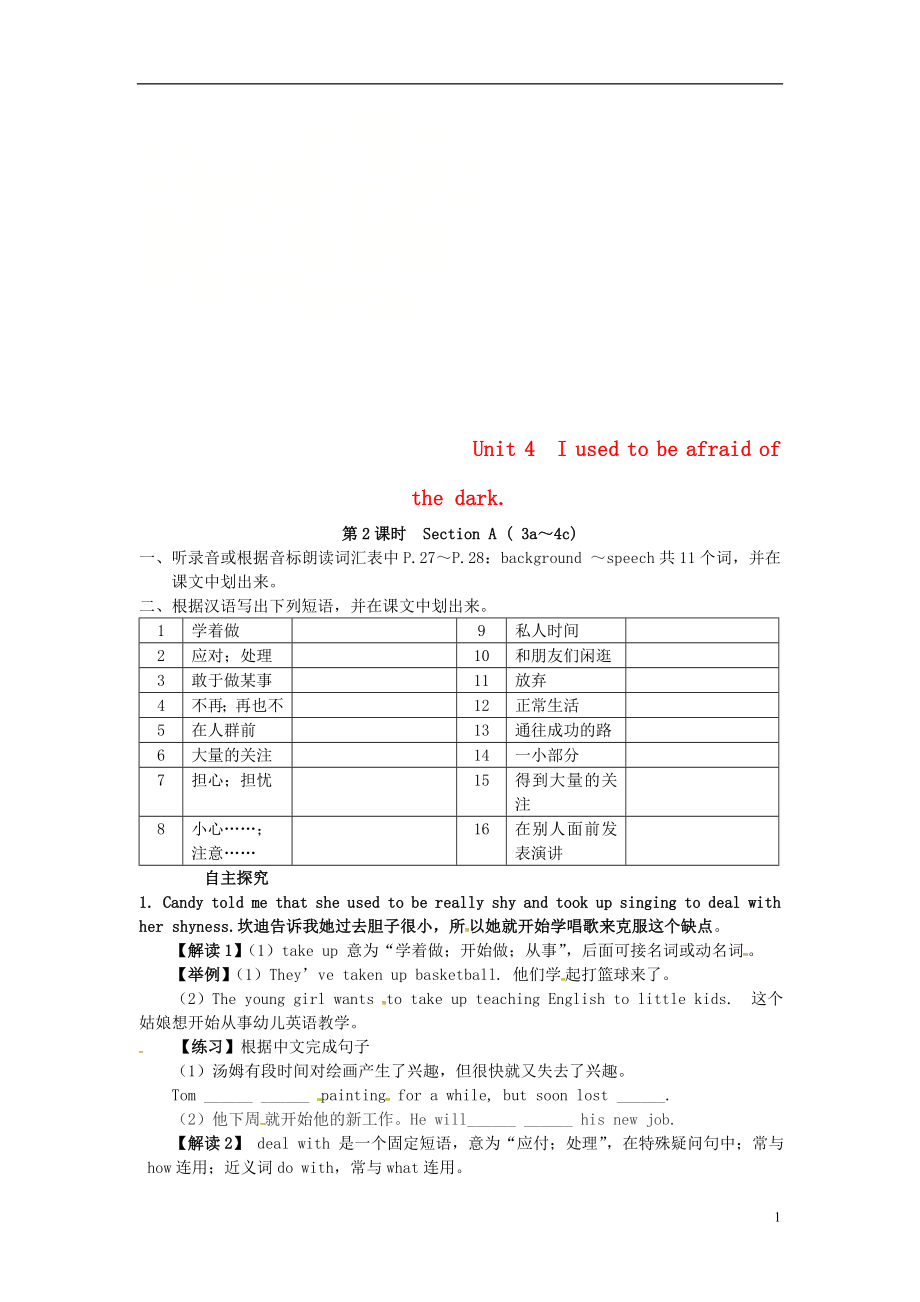《山西省運城市垣曲縣九年級英語全冊 Unit 4 I used to be afraid of the dark(第2課時)Section A(3a-4c)學案(無答案)(新版)人教新目標版》由會員分享����,可在線閱讀��,更多相關(guān)《山西省運城市垣曲縣九年級英語全冊 Unit 4 I used to be afraid of the dark(第2課時)Section A(3a-4c)學案(無答案)(新版)人教新目標版(2頁珍藏版)》請在裝配圖網(wǎng)上搜索。
1�����、
Unit 4 I used to be afraid of the dark.
第2課時 Section A ( 3a~4c)
一�、聽錄音或根據(jù)音標朗讀詞匯表中P.27~P.28:background ~speech共11個詞����,并在課文中劃出來。
二����、根據(jù)漢語寫出下列短語����,并在課文中劃出來����。
1
學著做
9
私人時間
2
應對����;處理
10
和朋友們閑逛
3
敢于做某事
11
放棄
4
不再���;再也不
12
正常生活
5
在人群前
13
通往成功的路
6
大量的關(guān)注
14
一小部分
2�����、
7
擔心����;擔憂
15
得到大量的關(guān)注
8
小心……���;
注意……
16
在別人面前發(fā)表演講
自主探究
1. Candy told me that she used to be really shy and took up singing to deal with her shyness.坎迪告訴我她過去膽子很小,所以她就開始學唱歌來克服這個缺點。
【解讀1】(1)take up 意為“學著做;開始做�����;從事”����,后面可接名詞或動名詞。
【舉例】(1)They’ve taken up basketball. 他們學起打籃球來了。
(2)The young
3�����、 girl wants to take up teaching English to little kids. 這個姑娘想開始從事幼兒英語教學�。
【練習】根據(jù)中文完成句子
(1)湯姆有段時間對繪畫產(chǎn)生了興趣,但很快就又失去了興趣。
Tom ______ ______ painting for a while, but soon lost ______.
(2)他下周就開始他的新工作��。He will______ ______ his new job.
【解讀2】 deal with 是一個固定短語�����,意為“應付;處理”,在特殊疑問句中����;常與how連
4����、用;近義詞do with����,常與what連用����。
【舉例】(3) Do you have any good ideas to deal with the problem? 你有解決這個問題的好辦法嗎�����?
【練習】用do with 或deal with填空。
(3) He taught me how to______ ______ pressure.
(4) I don’t know what to ______ ______ these letters.
【解讀3】 shyness 是shy的名詞形式�����,有些英語形容詞以在其后面加上后綴-ness,變?yōu)槊~���。
【舉例
5�����、】happy—happiness kind—kindness busy—business
2. As she got better, she dared to sing in front of her class, and then for the whole school. 當她感覺好一點之后��, 她敢在全班同學面前唱歌了���,然后在全校同學面前唱�����。
【解讀1】dare 在此作行為動詞���,意為“敢于;膽敢”�,多用于表示做危險的或害怕做的事情,后常接帶to的動詞不定式�����,構(gòu)成dare to do sth.結(jié)構(gòu)���,表示“敢于做某事”。dare 也可以作情態(tài)動詞,常用于疑問句�����、否定句和條件從句中�����。
【舉例】Only a few journalists dared to report the event.
只有少數(shù)幾名記者敢于報導這一事件�����。
【練習】根據(jù)中文完成句子�����。
(1)我敢說我足夠勇敢能游過這條河。
I ______ ______ ______ that I’m ______ ______ to swim across the river.
(2)他不敢在這么多人面前說英語。He daren’t ______ ______ before such a crowd.
2
 山西省運城市垣曲縣九年級英語全冊 Unit 4 I used to be afraid of the dark(第2課時)Section A(3a-4c)學案(無答案)(新版)人教新目標版
山西省運城市垣曲縣九年級英語全冊 Unit 4 I used to be afraid of the dark(第2課時)Section A(3a-4c)學案(無答案)(新版)人教新目標版

